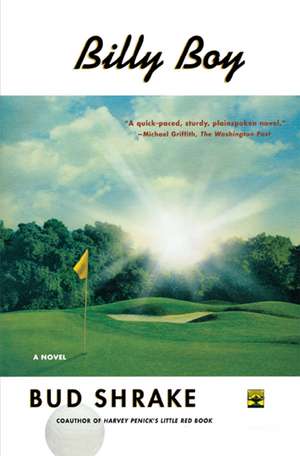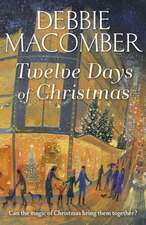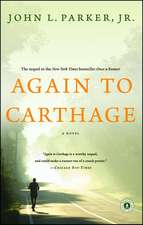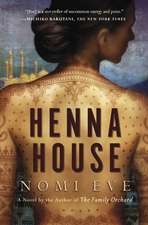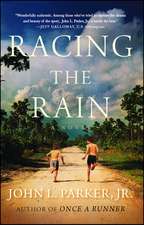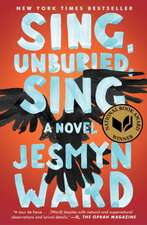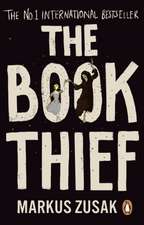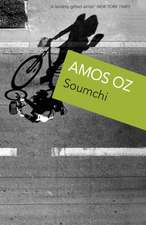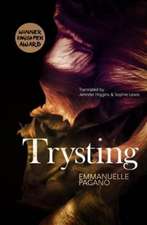Billy Boy: A Novel
Autor Bud Shrakeen Limba Engleză Paperback – 8 oct 2002
Before long, Billy makes a place for himself behind the privileged walls of Colonial. His attitude draws the approval of an eccentric millionaire club member, while his looks draw the attention of the millionaire's beautiful granddaughter--much to the displeasure of her boyfriend, the club champion. But Billy's run of luck is short-lived, as he confronts the hard realities of the world and of human nature both on and off the golf course. Now, Billy must face down his fears and doubts about where he comes from, where he wants to go, and who he really is. Bud Shrake's Billy Boy is an unforgettable coming-of-age tale of life, love, and beating the odds, set against the far-reaching horizons of the American West.
Preț: 97.62 lei
Nou
Puncte Express: 146
Preț estimativ în valută:
18.68€ • 20.29$ • 15.69£
18.68€ • 20.29$ • 15.69£
Carte disponibilă
Livrare economică 02-16 aprilie
Preluare comenzi: 021 569.72.76
Specificații
ISBN-13: 9780743227483
ISBN-10: 0743227484
Pagini: 240
Dimensiuni: 140 x 216 x 15 mm
Greutate: 0.26 kg
Ediția:Reprint
Editura: Scribner
Colecția Scribner
ISBN-10: 0743227484
Pagini: 240
Dimensiuni: 140 x 216 x 15 mm
Greutate: 0.26 kg
Ediția:Reprint
Editura: Scribner
Colecția Scribner
Notă biografică
Bud Shrake is the coauthor of Harvey Penick's Little Red Book and the author of many novels and screenplays. He lives in Austin, Texas.
Extras
Chapter One
The boy awoke to the snuffles of a woman softly sobbing in the bed across the room near the open window. For a moment he thought he was dreaming of his dead mother. Then he heard snoring and saw his father's undershirted back turned toward the woman, who was whimpering, "Where am I? Oh God, what has happened to me?"
She looked at the boy, surprised to see him. He rolled off his foldaway cot already dressed in Levi's and a white cotton polo shirt and white socks. He kept his eyes away from her as he tied the laces of his black tennis shoes and combed his hair with his fingers. The room stunk of whiskey and cigarettes.
"Who are you?" she said. "Where am I?"
"You came here with him," the boy said. "He's my daddy."
"He's too young to have a son your age. Why are you here?"
"This is our room," the boy said.
"I've never done anything like this before."
The boy nodded. He had pretended to be asleep when his father brought her to their hotel room after the saloons closed. A half bottle of bourbon lay on the floor on top of her white cotton dress and her earrings and her white gumsole shoes. The boy figured she was a waitress or a nurse. A cool breeze blew across his father, who slept nearest the window. They heard from down below a street-sweeping machine blasting water into the gutters.
"Please tell me you wasn't laying there watching me all night," the woman said.
"I was asleep."
"You promise?"
"We drove all night and all day and into the night again to get here. I was tired."
"Your daddy wasn't tired."
"He didn't do the driving."
With a snort, the boy's father slapped at a fly on his face, sat up and opened his eyes. He had the look of a cowboy, wide shouldered, lean, blond hair rumpled, firm jaw that needed a shave. He licked his lips and wiped his mouth with the back of a golden hairy wrist. He shook a cigarette out of a pack of Camels on the windowsill. Using the lucky Zippo he had carried through France and Germany during World War Two with his old artillery unit, he lit the cigarette and inhaled. He coughed.
"Billy Boy. Where you going in the middle of the night?" he said.
"The sun'll be up in a few minutes."
"You don't need to clear out because of her. She's leaving."
"You filthy rat, you got me drunk," the woman said.
"Billy Boy, I'm truly sorry about this. I didn't set out last night to bring a woman to the room."
The woman clutched the sheet tighter around her breasts and began weeping again, weakly. "I don't know your name," she said. "What's your damn name?"
"I'm Tyrone, remember? You said I look like Tyrone Power with a bleach job."
"Please, Jesus, I'll never drink again," the woman said. "What is your name, really?"
"Troy."
The woman looked around at the greasy wallpaper with faded roses on it.
"This room is trashy. What hotel is this?"
"The Half Moon," said Troy.
"You told me you kept a suite downtown at the Blackstone," she said.
"I'm liable to say most anything, Marie."
Hearing him speak her name, the woman looked at Troy with interest, seeing anew his opaque blue eyes that could frighten a person, his hair, crushed by the pillow, with yellow curls around his ears and forehead, streams of cigarette smoke coming from his nose and drifting around his lips. She dried her tears on the sheet and reached for Troy's cigarette to share it. She looked at the boy and frowned.
"What are you staring at?" she said.
"I'm leaving."
"You going to try for a bag at Colonial?" asked Troy.
"Yes sir."
"Not much chance for a new boy at a place like that."
"I'll try, though."
"They'll be rough on you," Troy said.
"I expect they will."
"Maybe you'll see Ben Hogan," Troy said.
"Hope so."
"Tell Ben I said 'hidy.'"
"More of your bull," the woman said. "You don't know Ben Hogan. Do you?"
"There was a time I could beat him."
"Sure there was. Two years ago when he was three-quarters dead and lay crippled in the hospital after a bus run head-on into his car," the woman said. "If he give you enough strokes, you might of beat him while he was unconscious in a cast. But now he's back on his feet, nobody can beat him."
"A golf expert, are you, Marie?" Troy said.
"My sister's husband plays every Saturday and Sunday at Rockwood Park on the Jacksboro Highway."
Troy smiled and tickled the woman's ear with a forefinger.
"I need the car today to scout around for business prospects. I'll set up a bank account," said Troy. "We'll have a first-class meal tonight when you come back, Billy Boy. You and me. We'll have two big steaks with French fries and onion rings at the Cattleman's Café. We'll order shrimp cocktails to start. Tomorrow we'll find a place to live. How's that?"
"That sounds great," the boy said.
"Would you please get out of here?" the woman said. "I need to potty."
Billy walked down one flight of stairs and turned into the lobby of the Half Moon Hotel. The head of a steer with an eight-foot spread of horns looked out from the wall through brown glass eyes. An old black man with a mop and a bucket was wetting the white tile floor. He had stacked up three copper spittoons to clean and polish later. The night manager leaned his elbows on the registration desk. A ceiling fan creaked overhead and rustled the sports pages that he was reading in the morning Star-Telegram. Billy noticed a front page headline that said reds drive on kwang ji. The boy knew his father was worried about being called back into the Army and sent to Korea. It was five years since Troy had been discharged as a first lieutenant after serving in hard fighting during World War Two, but all commissioned officers remained in the Reserves indefinitely, and a buddy had written in a letter that the Army was getting desperate for Forward Observers in the artillery in the hills of Korea.
"Where is Colonial Country Club at?" Billy asked the night manager.
The night manager looked up from the box scores and took sight of the boy with an amused appraisal from the tennis shoes up to the tangled hair. The boy could have passed for a younger brother, but he was clearly his father's son, the night manager thought. Narrow hips, a cocky way of walking, a tilt of the head. The same blue-gray eyes. A few hours ago a drunken older version of this kid had slipped the night manager two dollars and patted his shoulder and swaggered up the stairs with Marie, who worked at the beauty shop down the block but drank in saloons up and down North Main Street and Exchange Avenue.
"Now why on earth would you want to know something like that?" the night manager said.
"I need to go there," said Billy.
"Hey, Raymond, you hear this? The kid needs to go to Colonial Country Club."
"Well, knock me down and steal my teeth," the old black man said, slapping the tile with his mop.
The night manager looked at Billy. "For what?"
"To find some work."
"What're you? A hubcap thief?"
Billy's tennis shoes squeaked on the tile as he turned abruptly and started toward the door.
"Hey, boy," the night manager said.
Billy stopped and waited.
"Colonial Country Club is on the other side of the river about ten miles south of here."
"And watch out for the po-lice," said Raymond, sloshing his mop in the bucket. "They don't want boys like you walking through the Colonial neighborhood unless you be pushing a lawn mower."
The boy stepped through the open glass-and-wood door of the Half Moon Hotel and onto the sidewalk. The air smelled rich with the odor of cow manure from the huge stockyards nearby. The street-sweeping machine had left the curbs wet and the scent more pungent. There was a hint of hay and hide in the smell, and bits of straw floated among the bugs that darted around the streetlights. The boy noted that the block housed two more walk-up hotels like the Half Moon and three saloons with the streetlights reflected in their windows. On the other side of North Main Street he saw the New Isis Theater, a movie house. Billy loved movies, but he had been so tired after driving all the way from Albuquerque that he hadn't noticed the theater last night.
Halfway along the block Billy was relieved to find their black and yellow Chevy Bel Air, parked a little too close to the curb, but unharmed. The two-year-old Chevy was their most important possession. Truth be, Billy thought, the Chevy was their only possession other than the clothes on their backs and in their suitcases and the bank draft in his daddy's wallet. The night his daddy had arrived at their adobe house in Albuquerque two years ago in this almost new black and yellow Chevy, Troy had been laughing, looking wild and tough, flashing his big smile, staggering, drinking from a bottle of Wild Turkey. He said he won the engine and the frame of the car playing golf at Santa Fe Country Club, and the body and the tires shooting dice in the back room at El Nito in Tesuque.
Billy remembered that his mother had smiled without humor at the new Chevy and at Troy as he stumbled into the rose and lilac bushes and thumped against the wall. Hours later as Billy sat listening in his bed, smelling the scent of pinion from the log that smoldered in the fireplace, he thought he heard a slap and he seemed to hear his mother crying. Many nights while growing up, Billy had lain in bed or crouched at the door of his room listening to his parents arguing and fighting. He was afraid for his mother's beautiful frail body, angry at his daddy's rough drunken ways, ashamed of himself for not having the strength to rush into their room and make them stop. He had tried several times. At age eleven he had heard her crying and ran into the kitchen and saw blood on his mother's lips. Billy lost himself to rage. He swung a croquet mallet hard at his daddy's head, hoping to crush his skull, to kill him, to bring peace to their home. Troy had dodged the blow and knocked the boy down with an open hand, and Billy's mother ordered him back to bed. He sat in a wooden chair at his window and looked at the Sandia Mountain until the sun appeared over it, and he yearned to be gone from this house, but he was afraid to leave his mother, afraid of what Troy might do to her. Billy kept in his chair at the window until Sandia Mountain was red with light above its crest and he heard soft laughter from his parents' bedroom as they made love.
But the night Troy brought the black and yellow Chevy home, she yelled at her husband and wept loudly, and she slapped him, as she often did. And then their voices became low, solemn, restrained, broken by the dry cough his mother had developed, and about sunrise, Billy fell asleep in his chair looking out at Sandia Mountain. That was when they learned she had cancer. They buried her two weeks ago in Albuquerque and sold their house day before yesterday.
Outside the Half Moon Hotel, a slash of pink began spreading across the eastern sky, and the street lights flipped to dark as Billy was scraping away grasshoppers that had mashed against the Chevy windshield. He realized he must hurry. Golfers would be on the first tee in an hour, and he was ten miles from Colonial and on foot. It was amazing to think the golf course could be ten miles away but still inside the city. He began to understand what an enormous city Fort Worth was, and that everything from now on would be new and strange and dangerous.
Copyright © 2001 by Bud Shrake
The boy awoke to the snuffles of a woman softly sobbing in the bed across the room near the open window. For a moment he thought he was dreaming of his dead mother. Then he heard snoring and saw his father's undershirted back turned toward the woman, who was whimpering, "Where am I? Oh God, what has happened to me?"
She looked at the boy, surprised to see him. He rolled off his foldaway cot already dressed in Levi's and a white cotton polo shirt and white socks. He kept his eyes away from her as he tied the laces of his black tennis shoes and combed his hair with his fingers. The room stunk of whiskey and cigarettes.
"Who are you?" she said. "Where am I?"
"You came here with him," the boy said. "He's my daddy."
"He's too young to have a son your age. Why are you here?"
"This is our room," the boy said.
"I've never done anything like this before."
The boy nodded. He had pretended to be asleep when his father brought her to their hotel room after the saloons closed. A half bottle of bourbon lay on the floor on top of her white cotton dress and her earrings and her white gumsole shoes. The boy figured she was a waitress or a nurse. A cool breeze blew across his father, who slept nearest the window. They heard from down below a street-sweeping machine blasting water into the gutters.
"Please tell me you wasn't laying there watching me all night," the woman said.
"I was asleep."
"You promise?"
"We drove all night and all day and into the night again to get here. I was tired."
"Your daddy wasn't tired."
"He didn't do the driving."
With a snort, the boy's father slapped at a fly on his face, sat up and opened his eyes. He had the look of a cowboy, wide shouldered, lean, blond hair rumpled, firm jaw that needed a shave. He licked his lips and wiped his mouth with the back of a golden hairy wrist. He shook a cigarette out of a pack of Camels on the windowsill. Using the lucky Zippo he had carried through France and Germany during World War Two with his old artillery unit, he lit the cigarette and inhaled. He coughed.
"Billy Boy. Where you going in the middle of the night?" he said.
"The sun'll be up in a few minutes."
"You don't need to clear out because of her. She's leaving."
"You filthy rat, you got me drunk," the woman said.
"Billy Boy, I'm truly sorry about this. I didn't set out last night to bring a woman to the room."
The woman clutched the sheet tighter around her breasts and began weeping again, weakly. "I don't know your name," she said. "What's your damn name?"
"I'm Tyrone, remember? You said I look like Tyrone Power with a bleach job."
"Please, Jesus, I'll never drink again," the woman said. "What is your name, really?"
"Troy."
The woman looked around at the greasy wallpaper with faded roses on it.
"This room is trashy. What hotel is this?"
"The Half Moon," said Troy.
"You told me you kept a suite downtown at the Blackstone," she said.
"I'm liable to say most anything, Marie."
Hearing him speak her name, the woman looked at Troy with interest, seeing anew his opaque blue eyes that could frighten a person, his hair, crushed by the pillow, with yellow curls around his ears and forehead, streams of cigarette smoke coming from his nose and drifting around his lips. She dried her tears on the sheet and reached for Troy's cigarette to share it. She looked at the boy and frowned.
"What are you staring at?" she said.
"I'm leaving."
"You going to try for a bag at Colonial?" asked Troy.
"Yes sir."
"Not much chance for a new boy at a place like that."
"I'll try, though."
"They'll be rough on you," Troy said.
"I expect they will."
"Maybe you'll see Ben Hogan," Troy said.
"Hope so."
"Tell Ben I said 'hidy.'"
"More of your bull," the woman said. "You don't know Ben Hogan. Do you?"
"There was a time I could beat him."
"Sure there was. Two years ago when he was three-quarters dead and lay crippled in the hospital after a bus run head-on into his car," the woman said. "If he give you enough strokes, you might of beat him while he was unconscious in a cast. But now he's back on his feet, nobody can beat him."
"A golf expert, are you, Marie?" Troy said.
"My sister's husband plays every Saturday and Sunday at Rockwood Park on the Jacksboro Highway."
Troy smiled and tickled the woman's ear with a forefinger.
"I need the car today to scout around for business prospects. I'll set up a bank account," said Troy. "We'll have a first-class meal tonight when you come back, Billy Boy. You and me. We'll have two big steaks with French fries and onion rings at the Cattleman's Café. We'll order shrimp cocktails to start. Tomorrow we'll find a place to live. How's that?"
"That sounds great," the boy said.
"Would you please get out of here?" the woman said. "I need to potty."
Billy walked down one flight of stairs and turned into the lobby of the Half Moon Hotel. The head of a steer with an eight-foot spread of horns looked out from the wall through brown glass eyes. An old black man with a mop and a bucket was wetting the white tile floor. He had stacked up three copper spittoons to clean and polish later. The night manager leaned his elbows on the registration desk. A ceiling fan creaked overhead and rustled the sports pages that he was reading in the morning Star-Telegram. Billy noticed a front page headline that said reds drive on kwang ji. The boy knew his father was worried about being called back into the Army and sent to Korea. It was five years since Troy had been discharged as a first lieutenant after serving in hard fighting during World War Two, but all commissioned officers remained in the Reserves indefinitely, and a buddy had written in a letter that the Army was getting desperate for Forward Observers in the artillery in the hills of Korea.
"Where is Colonial Country Club at?" Billy asked the night manager.
The night manager looked up from the box scores and took sight of the boy with an amused appraisal from the tennis shoes up to the tangled hair. The boy could have passed for a younger brother, but he was clearly his father's son, the night manager thought. Narrow hips, a cocky way of walking, a tilt of the head. The same blue-gray eyes. A few hours ago a drunken older version of this kid had slipped the night manager two dollars and patted his shoulder and swaggered up the stairs with Marie, who worked at the beauty shop down the block but drank in saloons up and down North Main Street and Exchange Avenue.
"Now why on earth would you want to know something like that?" the night manager said.
"I need to go there," said Billy.
"Hey, Raymond, you hear this? The kid needs to go to Colonial Country Club."
"Well, knock me down and steal my teeth," the old black man said, slapping the tile with his mop.
The night manager looked at Billy. "For what?"
"To find some work."
"What're you? A hubcap thief?"
Billy's tennis shoes squeaked on the tile as he turned abruptly and started toward the door.
"Hey, boy," the night manager said.
Billy stopped and waited.
"Colonial Country Club is on the other side of the river about ten miles south of here."
"And watch out for the po-lice," said Raymond, sloshing his mop in the bucket. "They don't want boys like you walking through the Colonial neighborhood unless you be pushing a lawn mower."
The boy stepped through the open glass-and-wood door of the Half Moon Hotel and onto the sidewalk. The air smelled rich with the odor of cow manure from the huge stockyards nearby. The street-sweeping machine had left the curbs wet and the scent more pungent. There was a hint of hay and hide in the smell, and bits of straw floated among the bugs that darted around the streetlights. The boy noted that the block housed two more walk-up hotels like the Half Moon and three saloons with the streetlights reflected in their windows. On the other side of North Main Street he saw the New Isis Theater, a movie house. Billy loved movies, but he had been so tired after driving all the way from Albuquerque that he hadn't noticed the theater last night.
Halfway along the block Billy was relieved to find their black and yellow Chevy Bel Air, parked a little too close to the curb, but unharmed. The two-year-old Chevy was their most important possession. Truth be, Billy thought, the Chevy was their only possession other than the clothes on their backs and in their suitcases and the bank draft in his daddy's wallet. The night his daddy had arrived at their adobe house in Albuquerque two years ago in this almost new black and yellow Chevy, Troy had been laughing, looking wild and tough, flashing his big smile, staggering, drinking from a bottle of Wild Turkey. He said he won the engine and the frame of the car playing golf at Santa Fe Country Club, and the body and the tires shooting dice in the back room at El Nito in Tesuque.
Billy remembered that his mother had smiled without humor at the new Chevy and at Troy as he stumbled into the rose and lilac bushes and thumped against the wall. Hours later as Billy sat listening in his bed, smelling the scent of pinion from the log that smoldered in the fireplace, he thought he heard a slap and he seemed to hear his mother crying. Many nights while growing up, Billy had lain in bed or crouched at the door of his room listening to his parents arguing and fighting. He was afraid for his mother's beautiful frail body, angry at his daddy's rough drunken ways, ashamed of himself for not having the strength to rush into their room and make them stop. He had tried several times. At age eleven he had heard her crying and ran into the kitchen and saw blood on his mother's lips. Billy lost himself to rage. He swung a croquet mallet hard at his daddy's head, hoping to crush his skull, to kill him, to bring peace to their home. Troy had dodged the blow and knocked the boy down with an open hand, and Billy's mother ordered him back to bed. He sat in a wooden chair at his window and looked at the Sandia Mountain until the sun appeared over it, and he yearned to be gone from this house, but he was afraid to leave his mother, afraid of what Troy might do to her. Billy kept in his chair at the window until Sandia Mountain was red with light above its crest and he heard soft laughter from his parents' bedroom as they made love.
But the night Troy brought the black and yellow Chevy home, she yelled at her husband and wept loudly, and she slapped him, as she often did. And then their voices became low, solemn, restrained, broken by the dry cough his mother had developed, and about sunrise, Billy fell asleep in his chair looking out at Sandia Mountain. That was when they learned she had cancer. They buried her two weeks ago in Albuquerque and sold their house day before yesterday.
Outside the Half Moon Hotel, a slash of pink began spreading across the eastern sky, and the street lights flipped to dark as Billy was scraping away grasshoppers that had mashed against the Chevy windshield. He realized he must hurry. Golfers would be on the first tee in an hour, and he was ten miles from Colonial and on foot. It was amazing to think the golf course could be ten miles away but still inside the city. He began to understand what an enormous city Fort Worth was, and that everything from now on would be new and strange and dangerous.
Copyright © 2001 by Bud Shrake
Recenzii
Michael Griffith The Washington Post A quick-paced, sturdy, plainspoken novel.
Larry McMurtry Pulitzer Prize-winning author of Lonesome Dove A brilliant novel...Bud Shrake has done himself proud.
The San Diego Union-Tribune Takes a swing at at golf fiction with enjoyable results.
Mike Shea Texas Monthly A big-hearted tribute to the Zen of golf in Fort Worth, circa 1950...This golf fable doesn't shy away from honest emotions. Shrake's version of the past is not scratched and dinged by reality but worn to a pleasing patina by the passage of time.
Judi Goldenberg Richmond Times-Dispatch A vivid account of a golden age of golf and the men who made it memorable.
Larry McMurtry Pulitzer Prize-winning author of Lonesome Dove A brilliant novel...Bud Shrake has done himself proud.
The San Diego Union-Tribune Takes a swing at at golf fiction with enjoyable results.
Mike Shea Texas Monthly A big-hearted tribute to the Zen of golf in Fort Worth, circa 1950...This golf fable doesn't shy away from honest emotions. Shrake's version of the past is not scratched and dinged by reality but worn to a pleasing patina by the passage of time.
Judi Goldenberg Richmond Times-Dispatch A vivid account of a golden age of golf and the men who made it memorable.
